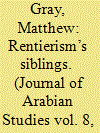|
|
|
Sort Order |
|
|
|
Items / Page
|
|
|
|
|
|
|
| Srl | Item |
| 1 |
ID:
163235


|
|
|
|
|
| Summary/Abstract |
The oil and gas-rich states of the Gulf Cooperation Council have long been treated as exceptional, where distributions of rent-based wealth to society assumedly preclude political dissent. Yet, by examining informal and formal opposition in Qatar, Bahrain, and Oman since 2011, this article disputes the effectiveness of this “co-optation mechanism” at the sub-national level. Drawing from 135 semi-structured interviews conducted with citizens of these states, it uncovers evidence of challenges to state authority even among nationals who should theoretically be co-opted. In examining the limits of rent-based co-optation, the article highlights two key political dynamics that have demonstrated a capacity to overpower rent-based incentives to remain politically inactive: ideology and repression. Societies, then, were far from quiescent, and this research examines the networks and dynamics that have allowed citizens to challenge state authority.
|
|
|
|
|
|
|
|
|
|
|
|
|
|
|
|
| 2 |
ID:
163233


|
|
|
|
|
| Summary/Abstract |
his paper examines rentier state theory (RST), and specifically “rentierism” as a more refined and nuanced variant of RST, arguing that while rentierism provides considerable utility in explaining the state-society relationships of the contemporary Arab states of the Persian Gulf, it is insufficient as a stand-alone explanation, and needs to be considered as a political dynamic of the state-society relationship, rather than as a structural explanation for the state itself, as early RST more ambitiously sought to do. Rentierism therefore needs to be utilized in combination with two other explanatory frameworks, neopatrimonialism and state capitalism. In effect, these are rentierism’s theoretical “siblings”: they sharpen a rentier analysis by providing greater nuance about how elite networks, business-government relations, and personalized politics operate and interact in the allocative settings of the Gulf, as well as illustrating both the scope and the limits of rentierism as an explanatory framework.
|
|
|
|
|
|
|
|
|
|
|
|
|
|
|
|
|
|
|
|
|